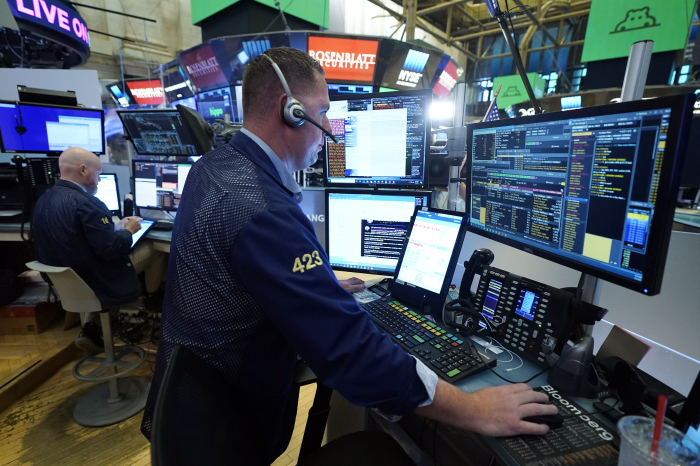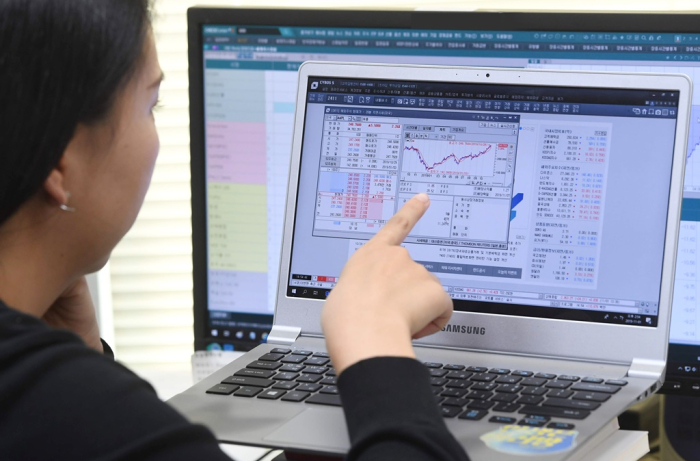Markets
Korean love for foreign stocks tops 100 tn won mark
Tesla, Apple, Amazon, Alphabet are top picks with growing interests in ETF
By Aug 05, 2021 (Gmt+09:00)
3
Min read
Most Read
LG Chem to sell water filter business to Glenwood PE for $692 million


Kyobo Life poised to buy Japan’s SBI Group-owned savings bank


KT&G eyes overseas M&A after rejecting activist fund's offer


StockX in merger talks with Naver’s online reseller Kream


Mirae Asset to be named Korea Post’s core real estate fund operator


Related Articles

South Koreans’ appetite for foreign stocks continued to grow with holdings of overseas shares by retail investors exceeding the 100 trillion won mark. Most of them held US technology stocks with increasing desires to realize the American Dream through equity investment.
The balance of overseas stock investment by South Koreans, excluding institutional names, totaled $89 billion (101.7 trillion won) as of end-July, about 20 trillion won up from the end-2020, according to the Korea Securities Depository’s (KSD) data on Aug. 4. That was more than a double of some 50 trillion won at the end of 2019 before the COVID-19 outbreak.
The balance was higher than SK Hynix’s market capitalization of 88 trillion won, the second-largest in the country, as well as a combined 83 trillion won market capitalization of Hyundai Motor Co. and Kia Corp.
The increase came as individual investors, known as the Ants, have bought 17.2 trillion won worth of foreign stocks so far this year, more than their total net purchase of 16.3 trillion won in the country’s junior Kosdaq last year, while record-breaking US stocks raised the values of their holdings.
Their top-picks included major US growth stocks such as Tesla Inc., Apple Inc., Amazon.com Inc., Alphabet Inc. and Nvidia Corp. with holdings of those stocks at around 20 trillion won. Some, which had invested in meme stocks or penny shares, are looking for growth blue chips and exchange traded funds (ETFs) for diversified investment. Meme stocks are those that see excessive trading volume and dramatic price increases, mostly fueled by buzz on social media.
“Many investors including the ultra-rich are confident about growth in US stocks,” a NH Investment & Securities’ private banker Kim Jin-gon. “Recently, the younger generation is also investing with belief that US growth stocks will increase their assets in a longer term.”
About ten years ago, Korean investors were interested only in stocks in other Asian countries. Nippon Steel was their top-pick, followed by China Gas Holdings Ltd. listed on the Hong Kong Exchanges and Clearing. US stocks were an unknown territory, even looking risky. In 2016, Visa ranked the third after Nippon Steel and China Gas, but Japanese and Chinese stocks accounted for most of the top-pick list. Korean investors accelerated buying US stocks from 2018 placing Amazon.com at the top to the list, but their holdings of the share were 800 billion won.

FROM TESLA TO ETF
Tesla changed the landscape of their investment in overseas stocks. Korean retail investors held $9.2 billion in Tesla shares as of end-July, the largest among foreign stocks, even as a 3.7% loss from Tesla in the first half caused massive sell-off in June and July. The Ants increased bets on Tesla’s growth potential.
In addition to US growth stocks, China’s Ganfeng Lithium Co. the world’s third-largest producer of lithium chemicals for electric vehicle (EV) batteries, ranked tenth in the top 10 favorite foreign stock list. Its shares have surged 86% so far this year as the fast-growing EV markets lifted lithium prices.
Investment in ETFs also surged with Invesco QQQ ETF and SPDR S&P 500 ETF in the list as some investors avoided specific stocks to reduce risks from limited information. About a half of foreign stocks purchased by retail investors since July were ETFs.
“Investment among the Ants in blue chips and ETFs are increasing at the expense of riskier stocks. That is a part of changes as overseas stock investment has become a trend,” said Park Sang-ho, an analyst for global investment at NH Investment & Securities.
Write to Jae-Won Park at wonderful@hankyung.com
Jongwoo Cheon edited this article.
More to Read
Comment 0
LOG IN


